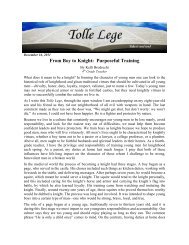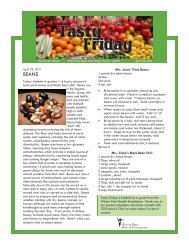how to write a college application essay - The Geneva School
how to write a college application essay - The Geneva School
how to write a college application essay - The Geneva School
You also want an ePaper? Increase the reach of your titles
YUMPU automatically turns print PDFs into web optimized ePapers that Google loves.
BE SPECIFIC<br />
Remember that the admissions board is reading hundreds of <strong>application</strong>s, and you must make<br />
yours memorable. Some students resort <strong>to</strong> gimmicks: 8-inch-by-10-inch glossy pictures of<br />
themselves hang gliding, or a videotape or a car<strong>to</strong>on book about themselves. You may have heard<br />
s<strong>to</strong>ries about an ordinary student getting in<strong>to</strong> an exclusive <strong>college</strong> by taking a creative or startling<br />
approach. But gimmicks are high risk. Maybe the admissions board does not have the time or the<br />
equipment <strong>to</strong> play tl1e videotape of your band. Maybe you will seem egocentric or cute or, more<br />
likely, as though you are dodging the difficult task that everyone else has done: writing an <strong>essay</strong>.<br />
You can make yourself stand out from the crowd and stress your individuality by a less risky<br />
method. Your English teachers have been telling you for years <strong>to</strong> use specifics when you <strong>write</strong>.<br />
Specifics make a piece of writing memorable. This basic principle of good writing applies, as<br />
well, <strong>to</strong> writing the <strong>college</strong> <strong>essay</strong>. Be specific. Tell the truth about yourself as specifically as<br />
possible. If you claim that you like school, say exactly what you like: "I like biology and got<br />
particularly interested in a three-month project I did about algae on the teeth:' Always be as<br />
specific as possible.<br />
NARROW YOUR TOPIC<br />
You have only one-and-a-half <strong>to</strong> two pages for this <strong>essay</strong>. You can’t <strong>write</strong> about everything that<br />
has ever happened <strong>to</strong> you. You need one <strong>to</strong> three <strong>to</strong>pics for this paper. You must pick a few of the<br />
most important aspects of your identity.<br />
If you cover <strong>to</strong>o much, you will be forced <strong>to</strong> be superficial. Don't say, "I like school. I am a<br />
leader. I play basketball. I've traveled <strong>to</strong> Sri Lanka, Alaska, Iowa, and South Africa. I play the<br />
violin. I work every weekend. I believe in responsibility. I want <strong>to</strong> be famous:' Pick one, two, or<br />
at the most, three important things about yourself and concentrate on them.<br />
SHOW, DON'T TELL<br />
You need <strong>to</strong> know and apply the writing principle of "s<strong>how</strong>, don't tell"; Give the readers such<br />
convincing evidence that they draw the conclusion you want them <strong>to</strong> draw. If you provide all the<br />
evidence of your fine qualities, you don't have <strong>to</strong> list them. Besides, the <strong>college</strong> will be much<br />
more likely <strong>to</strong> consider you sincere if you give examples rather than a list of glorious adjectives<br />
about yourself.<br />
For instance, you might be embarrassed <strong>to</strong> say, "I am extremely responsible.” Instead you could<br />
say, "Last summer, I was put in charge of 12 ten-year-old girls for a three-day hike.” When the<br />
<strong>college</strong> admissions board members read your example, they will come <strong>to</strong> the conclusion, "Ah,<br />
some adult must have felt this applicant could be responsible for a dozen children's health and<br />
safety for several days. This sounds like a responsible person.” Give your readers the evidence<br />
and examples, and they will reach the right conclusions.<br />
DESCRIBE WHAT YOU HAVE DONE<br />
You don't need a long list of flashy experiences. What you have experienced is not as important<br />
as what you have done with the experience. Real maturity depends on <strong>how</strong> you understand what<br />
has happened <strong>to</strong> you and whether you let your experiences change your perceptions.<br />
Colleges want <strong>to</strong> know <strong>how</strong> you have reacted <strong>to</strong> your experiences. For example, many students<br />
have failed some test or course. Colleges would like <strong>to</strong> know what you did with that failure. Did<br />
you mope Blame the teacher Quit doing homework because you were angry at the failure Did<br />
you see the failure as a warning, an impetus, a challenge






